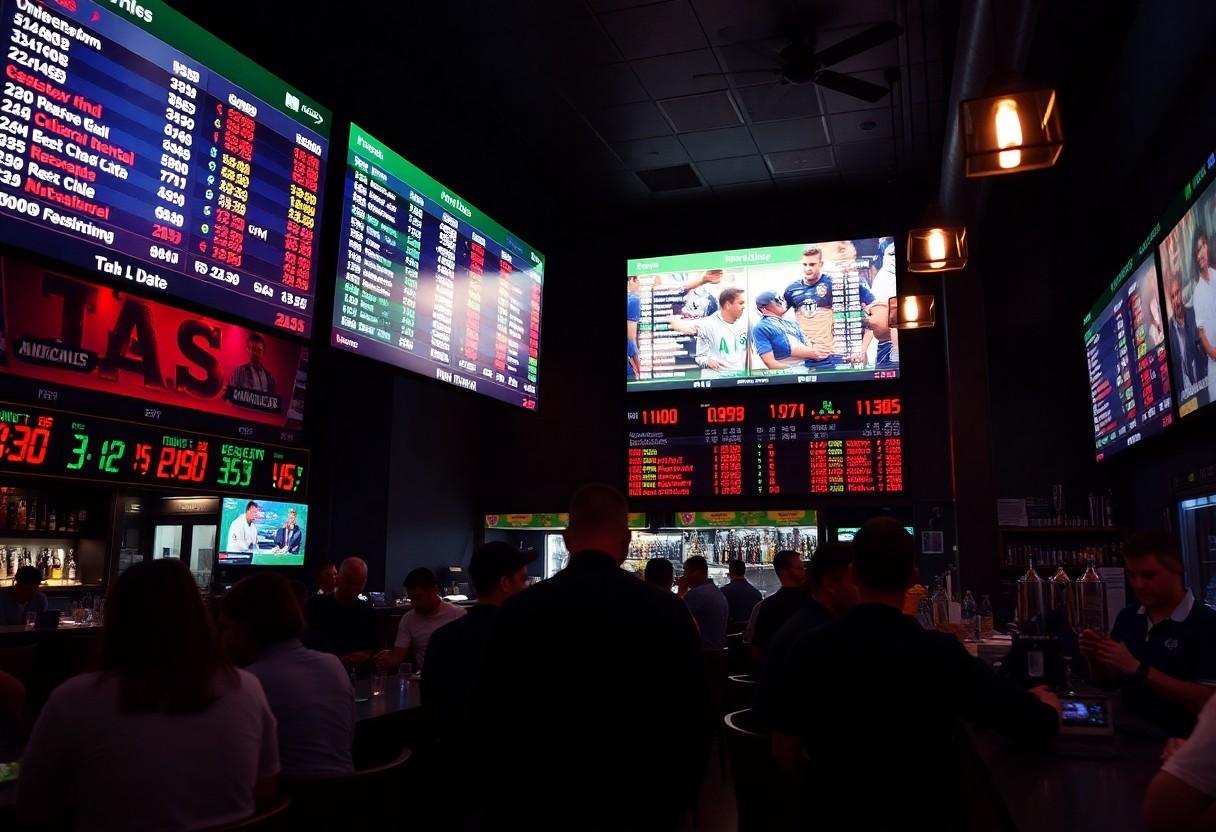
Beginner’s Guide To Understanding Live Betting Odds In Real Time
There’s a growing interest in live betting, but understanding the odds involved can be challenging for newcomers. This guide will help beginners navigate the complexities of real-time betting odds, ensuring they grasp how odds fluctuate based on game events and player performance. By the end, you’ll be equipped with the knowledge needed to enhance your betting strategy while minimizing risks and maximizing potential gains.
Types of Live Betting Odds
Live betting odds can vary significantly depending on the type employed during an event. Understanding these different types can enhance your betting strategy and decision-making process. Here are the most common types of odds:
- Fixed Odds
- Floating Odds
- Decimal Odds
- Fractional Odds
- Moneyline Odds
Any understanding of these types will aid bettors in making informed decisions throughout the event.
| Fixed Odds | Odds that remain constant regardless of changes in the game. |
| Floating Odds | Odds that fluctuate based on live game developments. |
| Decimal Odds | A straightforward representation of potential payout. |
| Fractional Odds | Odds expressed as fractions indicating profit over stake. |
| Moneyline Odds | Odds presented as positive or negative numbers. |
Fixed Odds
With fixed odds, players lock in their betting price at the moment the bet is placed. This provides a sense of security, as the odds won’t change before the outcome is determined. For example, if you bet on a football match with fixed odds of 2.00 for Team A to win, your potential return remains the same regardless of in-game events.
Floating Odds
Floating odds adapt in real time as the event unfolds, reacting to player performance, injuries, and other impactful factors. These odds can create opportunities for strategic betting, allowing bettors to capitalize on favorable changes. For instance, if a key player is injured during a match, floating odds may shift to reflect the decreased chances of that team winning.
Floating odds reflect the dynamic nature of live sports. Adjustments can occur frequently within minutes, meaning bettors must stay vigilant to make the most of these odds. Whether it’s a sudden lead change or a goal scored against expectations, floating odds allow savvy bettors to adjust their strategies on-the-fly, maximizing potential profits while minimizing risk.
Factors Influencing Live Betting Odds
Numerous elements can alter live betting odds in real time, making it crucial to stay informed. Key factors include:
- Game dynamics
- Team/player performance
- In-game injuries
- Weather conditions
- Fan sentiment
The understanding of these factors can enhance betting strategies.
Game Dynamics
Changes in game dynamics, such as penalty calls or sudden momentum shifts, can significantly sway live betting odds. For instance, a last-minute goal in soccer may cause odds to shorten for the leading team, influencing bettors’ decisions.
Team/Player Performance
Team/player performance plays a pivotal role in determining live betting odds. The statistics showcasing recent form, injuries, and head-to-head results can lead to rapid shifts in the odds offered. If a star player has an exceptional or lackluster performance, this can directly impact the likelihood of victory, prompting bookmakers to adjust their odds accordingly.
A classic example includes a player who consistently scores in recent matches; their presence can shorten a team’s odds significantly. Conversely, if a critical player gets injured or receives a red card, the odds for their team may lengthen drastically. The shift can be immediate, underscoring the necessity of real-time information for successful live betting strategies.
Step-by-Step Guide to Placing Live Bets
| Step | Description |
|---|---|
| 1. Choose a Sportsbook | Select a reputable sportsbook that offers live betting options tailored to your preferences. |
| 2. Fund Your Account | Deposit the desired amount via a secure payment method to enable betting. |
| 3. Navigate to Live Betting | Find the live betting section and explore available sports and events in real-time. |
| 4. Place Your Bet | Execute your bet by selecting odds and confirming your wager. |
Choosing a Sportsbook
Selecting a sportsbook involves considering factors like live betting options, user interface, and available markets. Look for platforms that support in-play wagering and provide competitive odds. Customer reviews can reveal the platform’s reliability and efficiency during high-stakes betting moments. Ensure the sportsbook is licensed to guarantee safety and compliance with regulations.
Executing the Bet
After deciding on a wager, confirming the bet quickly can be the difference between success and missed opportunities. Most live betting interfaces allow instant selection of odds adjustments, making it vital to act promptly as game dynamics change. Each sportsbook layout varies, but generally, you will need to enter your desired stake and confirm your bet swiftly to lock in those odds.
Executing the bet also involves understanding the time sensitivity of live betting; odds can fluctuate with every play. Ensure your chosen betting method simplifies this process, ideally one-click wagering. Knowing how to navigate through different bet types—such as moneylines, spreads, and totals—helps in making informed decisions while betting live. Keep an eye on game stats and analytics available on the site to enhance decision-making during intense moments.
Tips for Successful Live Betting
To enhance your chances of winning in live betting, consider these strategies:
- Stay updated on game statistics as they unfold.
- Observe key player performance trends and injuries.
- Utilize in-play data to spot value bets.
- Set a budget and stick to it.
- Focus on sports you know well for informed decisions.
This approach to live betting increases potential profitability.
Research and Analysis
Analyzing teams’ current form and player statistics is vital for informed live betting. Factors such as recent performance, head-to-head statistics, and injury reports play a significant role in predicting outcomes. Utilize reputable sports analytics platforms to gather real-time data. This research enables bettors to identify shifting odds and make profitable wagers during the game.
Timing Your Bets
Effective live betting hinges on the timing of your wagers. Placing bets after analyzing the flow of the game can yield better odds and opportunities. Watch for momentum shifts, as these moments often influence the odds significantly, sometimes offering hidden value.
Timing is everything in live betting; waiting for pivotal moments can yield advantageous odds. For instance, if a team scores a goal or experiences a red card, the odds often shift dramatically. Quick reactions to these events can unlock lucrative betting opportunities. Furthermore, understanding the psychological aspects of both teams during critical moments can inform your betting strategy. Monitoring the game closely and making bets at peak times can enhance your overall success rate.
Pros and Cons of Live Betting
| Pros | Cons |
|---|---|
| Real-time betting adjustments | Potential for impulsive decisions |
| More betting options available | Increased risk of losses |
| Enhanced engagement with events | Variable odds can confuse bettors |
| Opportunity for strategic betting | Technical glitches can hinder betting |
| Immediate feedback on bets made | Requires quick decision-making skills |
Advantages of Live Betting
Live betting offers the distinct advantage of placing bets in real-time as the action unfolds. Users have access to constantly updated odds, allowing them to react to the dynamics of the game. This interactivity enhances the excitement and engagement of watching live sports. Bettors can capitalize on favorable situations or adjust their strategies based on performance trends, providing a unique edge compared to pre-match bets.
Disadvantages to Consider
While live betting increases excitement, it also presents significant risks. The fast-paced environment may lead to hasty decisions that aren’t well thought out, potentially resulting in substantial losses. Additionally, the constant fluctuation of odds can create confusion, making it challenging for bettors to track the best opportunities. This volatility requires experienced judgment and quick action, which can be daunting for beginners.
Moreover, the psychological pressure during live betting can elevate stress levels, leading bettors to chase losses or overexpose themselves financially. Technical difficulties, such as website lags or app crashes, may obstruct timely bets, adding another layer of frustration to the experience. These elements create a high-stakes atmosphere that can be overwhelming, particularly for those new to the betting scene.
Conclusion
Hence, mastering live betting odds in real time is vital for enhancing your wagering experience. By understanding how odds fluctuate based on game dynamics and public sentiment, you can make informed decisions and capitalize on favorable situations. Staying updated with real-time data and recognizing betting patterns will empower you to leverage opportunities as they arise. Ultimately, a solid grasp of live betting odds not only increases your chances of success but also enriches your engagement with the game.
FAQ
Q: What are live betting odds?
A: Live betting odds are the current odds offered by sportsbooks during an ongoing event. These odds fluctuate based on real-time developments in the game, such as player performance, injuries, and overall game dynamics, allowing gamblers to place bets as the action unfolds.
Q: How do live betting odds change during a match?
A: Live betting odds change dynamically based on various factors, including the score, time remaining, and momentum shifts. For example, if a team scores a goal or a player gets injured, the odds for different betting options may adjust to reflect the changing situation in the match.
Q: What strategies can I use when betting on live odds?
A: Effective strategies for live betting include closely monitoring the game for momentum shifts, setting a budget for your bets, and focusing on specific markets where you have expertise. It’s also beneficial to act quickly, as odds can change rapidly, reflecting real-time performance and events.
